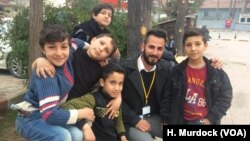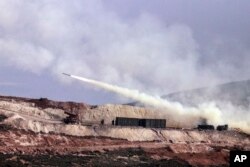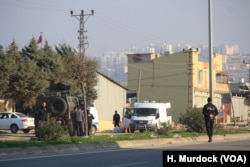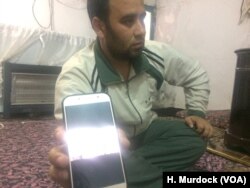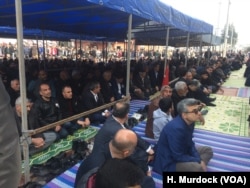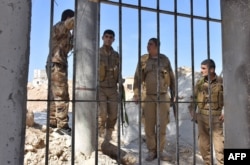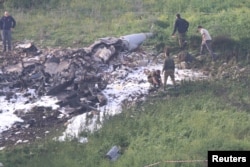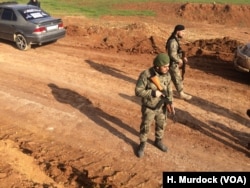“We are always afraid of being bombed,” says 12-year-old Habib, perching on the edge of a park bench bearing the Turkish border town’s name, Reyhanli. “But our parents are even more scared.”
His tone is joking, but his friends don’t laugh. “One rocket dropped next to my house two days ago,” adds another 10-year-old boy. Like many of the other children playing in the town square, these boys are Syrians who fled airstrikes and Islamic State militants before traveling to Turkey last year.
The rockets crashing into their new neighborhood come from Afrin, Syria, where Turkish forces are battling Kurdish forces. And as Syria sees a new wave of international conflicts being fought within its borders, families fear they will never be free of the violence.
“Our home was bombed in Syria when we were inside,” says one boy, before resuming their game in the square.
Their parents haven’t been letting them play outside much since the Afrin battle began on January 20, but today is special. It is rumored high-level officials will visit the town, and the children say there may be a party.
As soldiers climb back into tanks parked around the town square, it becomes apparent that if an official appearance had been planned, the event is no longer on the schedule. But the boys pose for pictures and tease each other anyway. They enjoy a moment of levity, which dissolves as they describe life under Islamic State militants, including one particular incident.
“The IS soldiers told the guy to bring a knife,” says Ahmed, who says he is 11 years old. His friend Zien insists Ahmed is 10, like himself. “The man refused to bring the knife, but they got one anyway. I turned my face away when they started to cut off his head.”
Old alliances, new dangers
In a village further from the Syrian border about 20 kilometers away, 31-year-old Hussein and his family won’t go into town, where his father was killed by a rocket from Afrin in late January. Also Syrian, Hussein’s family fled to the relative safety of Turkey in 2013.
“The children are still taking shrapnel out of their bodies,” he says more than a week later, showing mobile phone video of his father, bleeding on the street to the sound of his mother wailing.
The war, he says, may have started as a conflict between the government and opposition fighters. Seven years later, it is a multi-faceted international disaster that is becoming more complex by the day and potentially more dangerous.
The United States and Turkey are now at odds in Syria, and NATO officials are attempting to defuse tensions as the prospect of a fight between these allies in Syria looms.
Turkey is fighting a Kurdish militia known as the YPG, which is supported by the United States in the fight against Islamic State. Turkey views the YPG as being linked to the PKK, a militant organization that has been waging an insurgency in the southeastern part of that country. Tens of thousands of people have been killed in Turkey in decades of attacks. Turkey, the U.S. and European Union have designated the PKK a terrorist organization.
The U.S. acknowledges the PKK and YPG have links, but sees the YPG as separate, and as its most reliable ally against IS militants in Syria.
In the skies, Israel has re-entered the fight, shooting down an alleged Iranian drone flown in from Syria. The result has been mass airstrikes in Syria, and the downing of an Israeli fighter jet.
For Syrian people trying to survive, the violence has not abated. The United Nations says it expects 1.5 million more people to flee their homes in 2018. Currently, roughly six out of 10 Syrian people are displaced.
As Hussein’s son serves coffee on the carpeted floor, his cousin Mohammad, a 43-year-old farmer, says the war is mostly about world powers competing for their own interests, with the entire population of Syria serving as collateral damage.
“Syrians are hiding 20 meters underground and they are still getting killed,” says Mohammad. His family fled Syria in 2013 after a bomb hit their neighbor’s house, killing 16 people, including a baby.
“They were all in the basement hiding,” adds Hussein. “But they were still killed.”
Ethnic tensions, old and new
Despite the international elements of the war, there is still an ongoing battle among Syrians about who will control the country; but, new elements of the Syrian war are complicating this fight and potentially inflaming ethnic tensions in the region.
Turkey is fighting in Afrin alongside the Free Syrian Army, an opposition military, with Kurdish-led forces. The FSA and the YPG have faced off before, but now, the FSA and Turkey together are favored to win.
No parties claim the fight is about ethnicity, but the division does fall largely along ethnic lines, with Turks and Arabs fighting Kurds. In other parts of the region, ethnic tensions have already deepened after Iraqi Kurds called for an independence vote in October, sparking violence and the Kurds’ loss of much of the land they were controlling in Iraq.
FSA soldiers say they are fighting for the Kurdish people, to free them from an oppressive militant group, but, demonstrators in Afrin and around the world have called for a halt to the operations they say are killing civilians.
Regardless of the motives, the fact is now Syrian Arabs are fighting Syrian Kurds over issues that Turkey considers essential to its security.
“Before we were all brothers,” says Hussien. “We used to marry each other. But now, I don’t know.”




